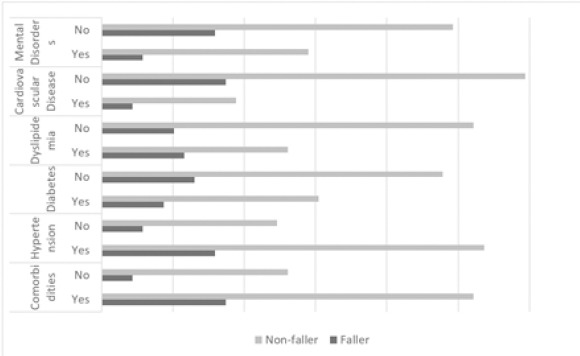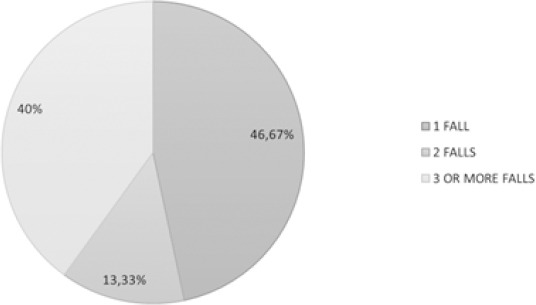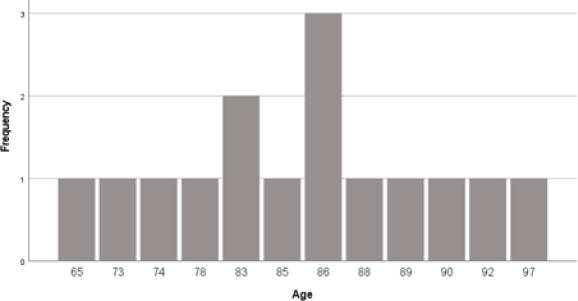制度化葡萄牙老年跌倒者的特征:有药剂师干预的地方吗?初步研究。
IF 1
Q3 PHARMACOLOGY & PHARMACY
Pharmacy Practice-Granada
Pub Date : 2022-10-01
Epub Date: 2022-10-06
DOI:10.18549/PharmPract.2022.4.2717
引用次数: 0
摘要
背景:考虑到跌倒的普遍性和社会影响,跌倒是一个主要的公共卫生问题。由于多种因素,如营养、功能/认知障碍、姿势不稳定、多药治疗和潜在的不适当药物(PIM)的存在,生活在长期护理机构(LTCF)的老年人因跌倒而受伤的风险更大。LTCF的药物管理是复杂的,通常是次优的,可能对跌倒至关重要。药剂师的干预很重要,因为他们有独特的药物知识。然而,绘制葡萄牙长期护理环境中药物活动影响的研究很少。目的:本研究旨在评估生活在LTFC中的老年跌倒者的特征,并探讨跌倒与该人群中几个因素之间的关系。我们还打算探讨PIM的患病率及其与跌倒发生的关系。方法:该研究在葡萄牙中部地区的两个老年人长期护理机构进行。我们纳入了65岁及以上的患者,他们没有行动不便或身体虚弱,并且能够理解葡萄牙语的口语和书面语。评估了以下信息:社会人口学特征、合并症、多药治疗、对跌倒的恐惧、功能、营养和认知状况。PIM根据Beers标准(2019)进行评估。结果:共有69名住院老年人,45名女性和24名男性,平均年龄为83.14±8.87岁。跌倒发生率为21.74%,其中46.67%(n=7)跌倒一次,13.33%(n=2)跌倒两次,40%(n=6)跌倒3次或3次以上。跌倒者主要是女性,受教育程度较低,营养良好,有中度至重度依赖,并表现出中度认知障碍。所有的成年人都害怕跌倒。该人群的主要合并症与心血管系统有关。每个患者都有多药治疗,88.41%的受试者至少发现一种PIM。对跌倒的恐惧(FOF)和认知障碍(在受过1至11年教育的受试者中)与跌倒的发生具有统计学意义(分别为0.005和0.05)。在任何其他因素上,跌倒者和非跌倒者之间没有发现显著差异。结论:本研究是对居住在葡萄牙LTCF的一组老年跌倒者的初步研究,并证明了对跌倒的恐惧和认知障碍与该人群跌倒的发生有关。多药治疗和PIM的高流行率强调了需要有针对性的干预措施,包括药剂师的合作,以优化这一人群的药物管理。本文章由计算机程序翻译,如有差异,请以英文原文为准。



Characterisation of institutionalised Portuguese older adult fallers: is there a place for pharmacist intervention? A preliminary study.
Background: Falls are a major public health issue, given their prevalence and social impact. Older adults living in long-term care facilities (LTCF) are at greater risk of injury resulting from a fall due to multiple factors, such as nutritional, functional/cognitive impairment, postural instability, polypharmacy, and the presence of potentially inappropriate medications (PIMs). Medication management in LTCF is complex and often sub-optimal and might be crucial for falls. Pharmacist intervention is important, since they have a unique knowledge of medication. However, studies mapping the impact of pharmaceutical activities in Portuguese LTC settings are scarce. Objective: This study aims to assess the characteristics of older adult fallers living in LTFCs and examine the relationship between falling and several factors in this population. We also intend to explore the prevalence of PIMs and their relationship with the occurrence of falls. Methods: The study was conducted in two long-term care facilities for elderly people, in the central region of Portugal. We included patients aged 65 and older with no reduced mobility or physical weakness and with the ability to understand spoken and written Portuguese. The following information was assessed: sociodemographic characteristics, comorbidities, polypharmacy, fear of falling, functional, nutritional and cognitive status. PIMs were evaluated according to the Beers criteria (2019). Results: A total of 69 institutionalised older adults, 45 women and 24 men, with a mean age of 83.14 ± 8.87 years were included. The prevalence of falls was 21.74% Out of these, 46.67% (n=7) fell once, 13.33% (n=2) fell twice, and 40% (n=6) fell 3 or more times. Fallers were mainly women, had lower levels of education, were well nourished, had moderate to severe levels of dependence, and displayed moderate cognitive impairment. All adult fallers had a fear of falling. The main comorbidities of this population were related to the cardiovascular system. Polypharmacy was present in every patient, and at least one PIM was identified in 88.41% of the subjects. Fear of falling (FOF) and cognitive impairment (in subjects with 1 to 11 years of education) showed statistically significant associations with the occurrence of falls (p=0.005 and p=0.05, respectively). No significant differences were found between fallers and non-fallers for any other factors. Conclusions: This present study is a preliminary contribution to characterise a group of older adult fallers living in Portuguese LTCFs and demonstrated that fear of falling and cognitive impairment are associated with the occurrence of falls in this population. The high prevalence of polypharmacy and PIMs emphasises the need for tailored interventions featuring the collaboration of a pharmacist to optimise medication management in this population.
求助全文
通过发布文献求助,成功后即可免费获取论文全文。
去求助
来源期刊

Pharmacy Practice-Granada
PHARMACOLOGY & PHARMACY-
CiteScore
3.90
自引率
4.00%
发文量
113
审稿时长
20 weeks
期刊介绍:
Pharmacy Practice is a free full-text peer-reviewed journal with a scope on pharmacy practice. Pharmacy Practice is published quarterly. Pharmacy Practice does not charge and will never charge any publication fee or article processing charge (APC) to the authors. The current and future absence of any article processing charges (APCs) is signed in the MoU with the Center for Pharmacy Practice Innovation (CPPI) at Virginia Commonwealth University (VCU) School of Pharmacy. Pharmacy Practice is the consequence of the efforts of a number of colleagues from different Universities who belief in collaborative publishing: no one pays, no one receives. Although focusing on the practice of pharmacy, Pharmacy Practice covers a wide range of pharmacy activities, among them and not being comprehensive, clinical pharmacy, pharmaceutical care, social pharmacy, pharmacy education, process and outcome research, health promotion and education, health informatics, pharmacoepidemiology, etc.
 求助内容:
求助内容: 应助结果提醒方式:
应助结果提醒方式:


